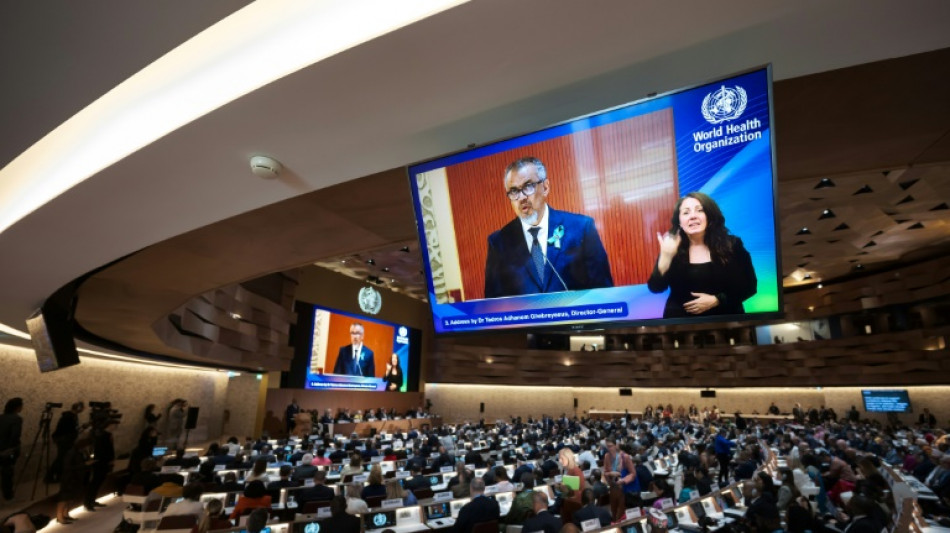
-
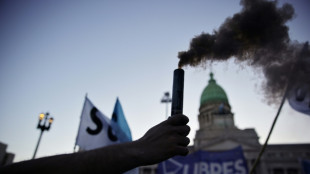 New setback for Milei as Argentine Congress overturns spending vetoes
New setback for Milei as Argentine Congress overturns spending vetoes
-
Canada reports first death linked to measles epidemic
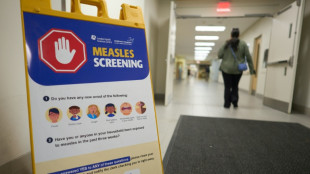
-
 Lille goalkeeper saves three penalties in Europa League win
Lille goalkeeper saves three penalties in Europa League win
-
Frenchwoman who escaped Nazi massacre dies aged 100
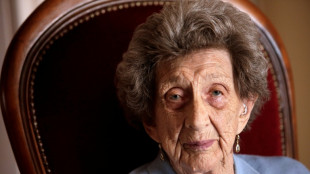
-
 US regulator approves new generic abortion pill, conservatives outraged
US regulator approves new generic abortion pill, conservatives outraged
-
'Resentment': Synagogue attack shocks Manchester Jewish community

-
 Villa win in Europa League as Forest and Scottish clubs lose
Villa win in Europa League as Forest and Scottish clubs lose
-
US farmers hit by trade war to get 'substantial' aid: Treasury chief

-
 'Terrorist attack' on UK synagogue kills two: police
'Terrorist attack' on UK synagogue kills two: police
-
Trump declares 'armed conflict' with drug cartels
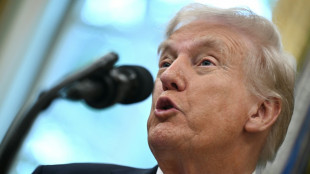
-
 Pulisic, McKennie headline US squad for October friendlies
Pulisic, McKennie headline US squad for October friendlies
-
Rallies against Israel interception of Gaza flotilla sweep Europe

-
 Trump ally threatens immigration sweep at Bad Bunny Super Bowl show
Trump ally threatens immigration sweep at Bad Bunny Super Bowl show
-
Putin vows 'significant' response as tension with Europe flares

-
 Unbeaten Eagles still seeking answers in NFL clash with Broncos
Unbeaten Eagles still seeking answers in NFL clash with Broncos
-
Boom or bubble: How long can the AI investment craze last?
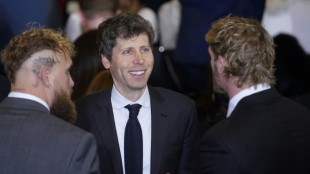
-
 Two killed in UK synagogue 'terrorist attack' on Yom Kippur
Two killed in UK synagogue 'terrorist attack' on Yom Kippur
-
Israel PM praises navy for intercepting Gaza bound flotilla

-
 Kenya president vows more 'professionalism' in anti-doping agency
Kenya president vows more 'professionalism' in anti-doping agency
-
US Treasury chief says 'fully prepared' to support struggling Argentina
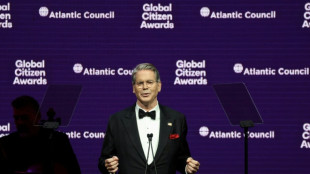
-
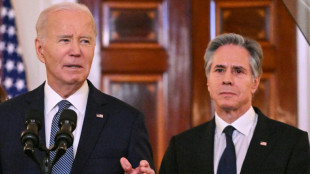 Blinken says Biden laid groundwork for Trump's Gaza plan
Blinken says Biden laid groundwork for Trump's Gaza plan
-
Musk joins 'cancel Netflix' campaign
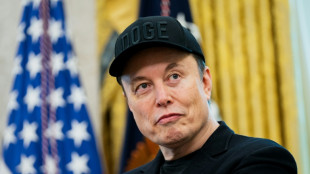
-
 Bangladesh cruise to win over Pakistan in Women's World Cup
Bangladesh cruise to win over Pakistan in Women's World Cup
-
Tesla car sales lifted by end of US electric auto tax credit
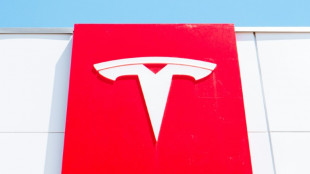
-
 Two dead, four wounded in UK synagogue 'terrorist attack'
Two dead, four wounded in UK synagogue 'terrorist attack'
-
Error 404: 48 hours of confusion in Afghanistan during internet blackout
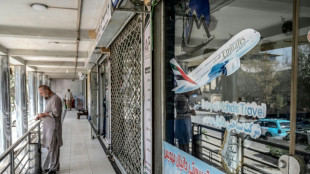
-
 Brazilian music legend Milton Nascimento has dementia: family
Brazilian music legend Milton Nascimento has dementia: family
-
Relaxed Verstappen has 'nothing to lose' as he hunts down McLarens
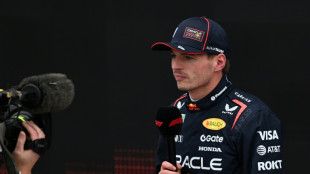
-
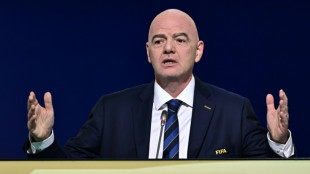 FIFA 'cannot solve geopolitical problems' like Gaza, says Infantino
FIFA 'cannot solve geopolitical problems' like Gaza, says Infantino
-
Piastri vows to learn 'tough lessons' after Baku disaster
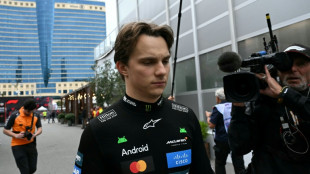
-
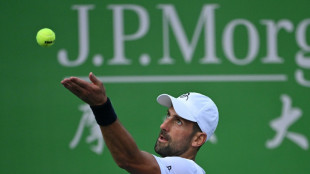 Djokovic says players 'not united enough' over tennis calendar
Djokovic says players 'not united enough' over tennis calendar
-
Days of violent anti-government protests grip Pakistan's Kashmir
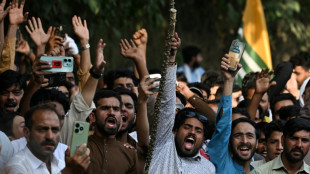
-
 Irish singer CMAT delays UK tour over infected wisdom tooth
Irish singer CMAT delays UK tour over infected wisdom tooth
-
Mateta handed France call-up for World Cup qualifiers

-
 Gauff powers into Beijing semi-finals and date with Anisimova
Gauff powers into Beijing semi-finals and date with Anisimova
-
Hamilton thanks 'overwhelming' response to dog Roscoe's death

-
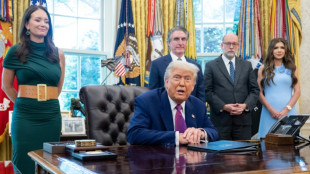 Trump ramps up pressure on Democrats over US government shutdown
Trump ramps up pressure on Democrats over US government shutdown
-
Gauff says more Slam money 'important' for future of tennis

-
 Strange 'rogue' planet spotted guzzling matter like a star
Strange 'rogue' planet spotted guzzling matter like a star
-
Two dead, three wounded in UK synagogue attack

-
 Germany reviews warship order after delays
Germany reviews warship order after delays
-
Norris says Verstappen 'genuinely a challenger' as F1 title race hots up

-
 35 years later, beloved East German car still sputters on
35 years later, beloved East German car still sputters on
-
Japan's Arc hopes take a hit with poor draw, Minnie Hauk gets plum stall

-
 Rescuers say no more signs of life in rubble of collapsed Indonesian school
Rescuers say no more signs of life in rubble of collapsed Indonesian school
-
Barcelona's Camp Nou return delayed again

-
 Israel to deport Gaza flotilla activists
Israel to deport Gaza flotilla activists
-
Contepomi backs inexperienced Argentina playmakers against Springboks

-
 Four wounded, suspect shot in Manchester synagogue attack
Four wounded, suspect shot in Manchester synagogue attack
-
Depardieu sues French broadcaster over report that sped up downfall
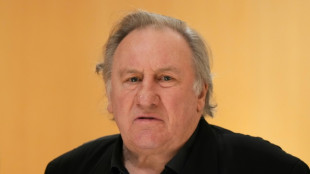

WHO restructures, cuts budget after US withdrawal
The World Health Organization tried to stabilise its finances at its annual assembly which ended on Tuesday, but still remains well short of reaching its already reduced target.
Hit by the withdrawal of its biggest donor, the United States, the WHO trimmed its already smaller 2026-2027 budget from $5.3 billion to $4.2 billion.
The UN health agency's programme budget for 2024-2025 was $6.8 billion.
The slimmer budget plan was approved during the World Health Assembly, which serves as the WHO's decision-making body.
But a funding gap of some $1.7 billion remains.
- How WHO funding works -
WHO budgets run in two-year cycles.
Founded in 1948, the agency initially received all its funding through "assessed contributions": nations' membership fees calculated according to wealth and population.
However, the WHO became increasingly reliant on "voluntary contributions", which only go towards outcomes specified by the donor.
By the 2020–2021 cycle, assessed contributions represented only 16 percent of the approved programme budget.
And the organisation had long been over-reliant on voluntary funding from a few major donors.
- 2026-2027 budget -
In 2022, member states agreed to increase their assessed contributions to represent 50 percent of the WHO's core budget by the 2030-2031 cycle at the latest -- giving the WHO more stable, flexible and predictable income streams.
They upped membership fees by 20 percent as part of the 2024-2025 budget.
At this year's assembly, countries approved another 20 percent increase in membership fees, which should represent an additional $90 million in revenue per year.
They also endorsed the WHO's 2026-2027 budget of $4.2 billion.
"Your approval of the next increase in assessed contributions was a strong vote of confidence in your WHO at this critical time," the organisation's chief Tedros Adhanom Ghebreyesus said Tuesday in closing the assembly.
Most of that money is already assured.
"We have now secured 60 percent of our base budget for 2026-2027; a remarkable result in today's financial climate," said Hanan Balkhy, the WHO's Eastern Mediterranean regional director.
But that means the agency is still $1.7 billion short, despite the reduced budget.
- Pledges -
At a pledging event last week, donors put in an additional $210 million for the 2025-2028 investment round, supporting the WHO's base budget.
That included $80 million from Switzerland, $57 million from the Novo Nordisk Foundation, $13.5 million from Sweden and $6 million from Qatar.
"In a challenging climate for global health, these funds will help us to preserve and extend our life-saving work," said Tedros.
- United States -
Upon returning to office in January, US President Donald Trump started the one-year process for leaving the WHO, and had frozen virtually all US foreign aid.
The United States was traditionally the WHO's largest donor. Washington's departure, and its refusal to pay its membership fees for 2024 and 2025, has left the WHO reeling financially.
Washington did not attend the World Health Assembly.
However, US Health Secretary Robert F. Kennedy Jr. sent a video message in which he branded the organization as bloated and moribund, and urged other countries to "consider joining us" in creating new institutions instead.
Kennedy said the UN agency was under undue influence from China, gender ideology and the pharmaceutical industry.
- Reorganisation -
The budget cuts have forced the WHO to reorganise.
It is reducing its executive management team from 14 to seven due to the dramatic US funding cuts.
The number of departments is being reduced from 76 to 34.
The WHO has not yet announced any large-scale layoffs, unlike other UN agencies.
T.Suter--VB
